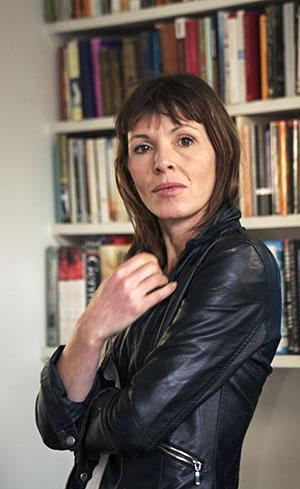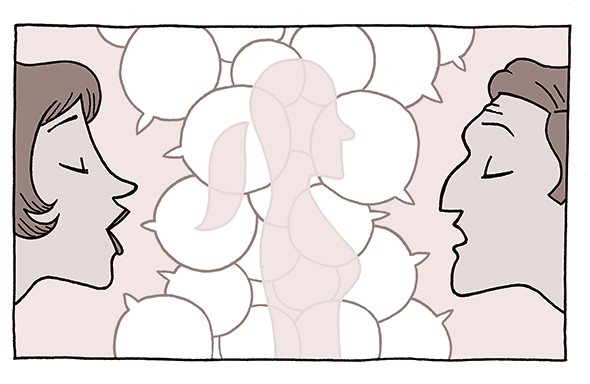The narrator of Rachel Cusk’s intense, engrossing new novel, Outline, is curiously effaced—an outline of a person. Over the course of the book we learn little about her, beyond that she lives in London, is recently divorced, is a writer, and has two sons. Mainly, she records everything happening around her—what others tell her, the way an airplane meal looks, the orderly décor of an Athens apartment she’s visiting. At one point, speaking to a Greek shipping magnate whom she meets on the airplane, she says something revealing about her sons. As boys, she tells him, her kids had loved to play together in “ongoing make-believe, a narrative which seemed to run like a magic river through our household, inexhaustible”:
And then one day the river dried up: their shared world of imagination ceased, and the reason was that one of them … stopped believing in it. In other words, it was nobody’s fault; but all the same it was brought home to me how much of what was beautiful in their lives was the result of a shared vision of things that strictly speaking could not have been said to exist.
This passage encapsulates the themes Cusk has wrestled with: the mysterious way the accord between two people dissolves into discord, the violence with which our old selves are sloughed off as new selves emerge (often to our surprise). In her novels—she has published seven, beginning with Saving Agnes (1993)—Cusk, who is British, frequently directs an unflinching gaze at marriages coming apart, or new mothers estranged from their former identities. Her controversial memoirs have done the same, first in A Life’s Work: On Becoming a Mother, and then in Aftermath: On Marriage and Separation, about her divorce from the photographer Adrian Clarke. For the cool, unsentimental sharpness of her vivisections, Cusk is either loathed or loved in England—a frequent object of derision on “Mumsnet.”
But the passage above also reflects a new preoccupation: a crisis about the very nature of fiction. Following the publication of Aftermath, Cusk told the Guardian that she had come to a place of “creative death.” “Once you have suffered sufficiently,” she noted, “making up John and Jane and having them do things together seems utterly ridiculous.” Fiction suddenly seemed “fake.” For three years, she neither wrote nor read. Like her narrator’s son, she had stopped believing in the “magic river.” And so this passage evokes a rupture of the contract between the novelist and her readers, who feel “a shared vision of things that strictly speaking could not have been said to exist.”
What happens when a writer loses his or her faith in fiction? In Cusk’s case, she renounced her usual painstaking fictional worlds in favor of something messier, and the result, ironically, may be her finest novel. Like Karl Ove Knausgaard’s My Struggle, Outline flouts the usual boundaries between fiction and nonfiction. (Cusk has cited Knausgaard as an inspiration, although the novels feel very different.) It’s looser and more ironic than her earlier novels, which, whatever their real strengths, often felt willed and a bit airless, as if Cusk had a thesis about the dreariness of married life she was out to prove. (The many characters in Arlington Park often seemed like figures in a tapestry, their interior lives beautifully detailed but rarely surprising.) Unlike them, Outline, which slowly submerges us in the narrator’s isolated post-divorce life, disavows the novel as a channel for psychological interiority. It eschews many of the typical conventions of fiction, such as firsthand dialogue (the narrator retells all the conversations), drama, and plot. Throughout, the narrator is less an actor in a storyline than a kind of scrim or a camera whose steady motion through the days gradually leads us to understand that she is one of those “on whom nothing is lost,” as Henry James once put it.
Outline takes place over a handful of days, during a trip to Athens. Faye, the narrator, has been asked to teach a writing seminar there. The book constellates around a series of conversations, some serious, some unintentionally funny, some troubling, between Faye and people she encounters, including other writers and editors. They talk; she listens. The mode is dry, withheld, yet knowing. Faye’s alertness to the comical ironies of contemporary life is present in the novel’s very first passage:
Before the flight I was invited to lunch at a London club with a billionaire I’d been promised had liberal credentials. He talked in his open-necked shirt about the new software he was developing, that could help organizations identify the employees most likely to rob and betray them in the future.
On the plane to Athens, the Greek shipping magnate tells her about his two ex-wives, one of whom he lionizes, the other, vilifies—which, as she tells him, makes his account of his divorces unreliable. Later, she walks through Athens with Ryan, a fellow writing teacher and a bit of a narcissist: He takes the inside of the street when traffic roars past, flirts with the waitress, fails to ask her about herself. She has a drink with a divorced Greek editor who, to her surprise, tells her that when he last saw her with her family, their apparent happiness made him feel his own life was a failure. His friend Angeliki, a Greek feminist and novelist, drops by; her work lately has been so exalted that her “new,” grand self fails to remember that she and Faye once met on different terms. Still, Faye notices, “she had a face so devastatingly anxious that anyone looking at it could only feel anxious too on her behalf.”
The novel feels agile and alive because the encounters are so nuanced. If these characters are at times absurdly blinkered, they are also perceptive about their own failings and losses. As Ryan tells Faye, about being unable to write: “I suppose it’s a bit like marriage. … You build a whole structure on a period of intensity that’s never repeated. It’s the basis of your faith and sometimes you doubt it, but you never renounce it because too much of your life stands on that ground.” This issue of losing the ground you stand on is a central theme of the book: Outline really is a novel of middle age. The Greek editor speaks of taking his children on a disastrous trip post-divorce, during which he realizes that no event in his life with them points toward anything else, as it had when his family was intact. For his children, though, his presence still provided the feeling of “home.” That, he tells Faye, was “the loneliest realization” and it changed him forever. “Improvement itself is perhaps a mere personal fantasy,” he says, “but this sense of life as a progression is something I want no more of.”

Photo by Siemon Scamell-Katz
Like her editor friend, Faye wants to “find a different way of living in the world,” one that involves coming “to believe more and more in the virtues of passivity, and of living a life as unmarked by self-will as possible.” (This is so fully a part of the book’s aesthetic that we don’t learn her name till three-quarters of the way through, when it’s almost a shock to learn.) Even the way she teaches is passive: During her class, she asks the students to tell her something they noticed on their way to class; what follows are more stories and accounts of “real life,” and very little discussion of writing. Her passivity leads Faye to be a little out of step with others; when the Greek magnate kisses her she is shocked he failed to realize that “the differences between them were obvious.”
All these set pieces form a kind of prismatic view of marriage and divorce, as through conversation the characters find themselves untangling the skein of knowledge that has come with loss and aging. (You might call it the puzzle of selfhood—as soon as you figure out what some relationship or passage of your life means, it’s gone or irrevocably changed.) All we can know, Cusk seems to suggest, are our own outlines. The word “outline” turns up several times in key places: First, there is the rich billionaire Faye lunches with, who, she drily notes, is “keen to give me the outline of his life story.” Then there is a playwright sharing the flat with Faye, who, following a separation from her husband, and a traumatic mugging, has found herself unable to write. On the way to Athens, she finds herself talking to a married, successful diplomat on the plane; as she listens to his life story, through a kind of “reverse exposition,” she begins to understand her own, “to see herself as a shape, an outline, with all the detail filled in around it while the shape itself remained blank.” The end of a marriage, it seems, may be the end of an illusion, but it takes a toll.
That this is also a novel about a crisis of aesthetic faith is made clear by one of the few dramatic confrontations in the book. At the end of class, Faye calls on a student, who hasn’t spoken, and whose expression has become “sourer and sourer.” (Along the way, Cusk is quite funny about local details; her description of the student growing evidently discontent will amuse—or perturb—anyone who has ever taught.) The student tells Faye:
She had obviously been mistaken. … She had been told this was a class about learning to write, something as far as she was aware involved using your imagination. She didn’t know what I thought I had achieved here, and she wasn’t all that interested in finding out.
Unlike the student, I found myself entirely interested; Outline feels like a significant achievement. In it, Cusk invites us to wonder what it would be like if we noticed more, and told ourselves fewer stories. There’s a telling miscommunication on the book’s last pages, where the Greek magnate, saying goodbye to Faye, mistakenly says “solicitude” instead of “solitude.” The confusion tells us something about the differences Cusk is exploring: Faye, for the time being, is out of the reach of solicitude, it would seem—firmly immersed in solitude. For her, solitude is a respite from the inarguable distortions of marriage: “I wasn’t sure it was possible, in marriage, to know what you actually were, or to separate what you were from what you had become through the other person.” The real self, she has come to feel, is illusory—a river she can’t quite believe in anymore. And love, like the “myth of self-improvement,” proved to be “an impermanent basis of living,” as Faye puts it. The conventional marriage plot is dead. The question is, what replaces it? All we have is an outline, Cusk suggests, a blueprint for something new.
—
Outline by Rachel Cusk. Farrar, Straus and Giroux.
See all the pieces in this month’s Slate Book Review.
Sign up for the Slate Book Review monthly newsletter.
